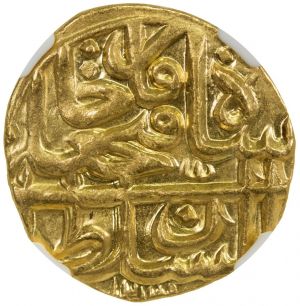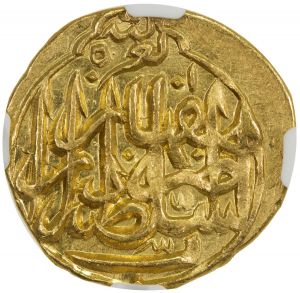Difference between revisions of "Iran AH 1213 toman KM-739.1"
m (Text replacement - "Iran AH 1214 rupi KM-E640" to "Afghanistan AH 1214 rupee KM-E640") |
(added link) |
||
| Line 17: | Line 17: | ||
''Link to:'' | ''Link to:'' | ||
| − | * [[Iran AH 1212 rial KM-651|AH 1212 rial, Maragheh mint, Baba Khan]] | + | * [[Iran AH 1212 rial KM-651|AH 1212 (1797) rial, Maragheh mint, Baba Khan]] |
| − | * [[Iran AH 1212 rial KM-665.6|AH 1212 rial, Tehran mint, coronation of Fath-'Ali Shah]] | + | * [[Iran AH 1212 rial KM-665.6|AH 1212 (1797) rial, Tehran mint, coronation of Fath-'Ali Shah]] |
| − | * [[Iran AH 1212 rial KM-655.6|AH 1212 rial, Tehran mint]] | + | * [[Iran AH 1212 rial KM-655.6|AH 1212 (1797) rial, Tehran mint]] |
| − | * [[Iran AH 1212 1/2 toman KM-736.1|AH 1212 half toman, Isfahan mint]] | + | * [[Iran AH 1212 1/2 toman KM-736.1|AH 1212 (1797) half toman, Isfahan mint]] |
| − | * [[Iran AH 1212 ashrafi|AH 1212 ashrafi, Tehran mint, Baba Khan]] | + | * [[Iran AH 1212 ashrafi|AH 1212 (1797) ashrafi, Tehran mint, Baba Khan]] |
| + | * [[Iran AH 1213 1/2 toman KM-736.2|AH 1213 (1798) half toman, Rasht mint]] | ||
* [[Iran AH 1213 1/2 toman KM 736.4|AH 1213 half toman, Tehran mint]] | * [[Iran AH 1213 1/2 toman KM 736.4|AH 1213 half toman, Tehran mint]] | ||
* [[Iran AH 1213 toman KM-739.5|AH 1213 toman, Rasht mint]] | * [[Iran AH 1213 toman KM-739.5|AH 1213 toman, Rasht mint]] | ||
Revision as of 10:23, 25 October 2024
This specimen was lot 624 in Stephen Album sale 32 (Santa Rosa, CA, September 2018), where it sold for $3,055. The catalog description[1] noted, "QAJAR: Fath 'Ali Shah, 1797-1834, AV toman, Isfahan, AH1213, with mint epithet Dar al-Saltana, bright brilliant luster, NGC graded MS64." The Qajars were a group of Turkic origin who lived in the area of Azerbaijan. They were sympathetic to the Safavids, who ruled in Persia from 1501-1736 AD. The Qajar Dynasty began when Mohammad Khan Qajar seized Mashhad (then under Durrani suzerainty – see Afghanistan) and put an end to the Afsharid Dynasty. The Qajars were forced to fight several defensive wars against Russia, losing territory each time. Foreign powers became more involved in Persia as the strategic nature of the region became clear. The empire was nearly bankrupt by the end of the 1800’s, and the dynasty finally fell when Reza Khan, a commander of the Persian Cossack Brigade, led a coup d’etat and launched the Pahlavi Dynasty in 1925 AD. This gold denomination was struck at numerous mints during the reign of Fath 'Ali Shah. It is listed from Isfahan for AH 1213 and 1217.
Recorded mintage: unknown.
Specification: 4.8 g, gold.
Catalog reference: A-2859, KM-739.1.
- Album, Stephen, Checklist of Islamic Coins, 3rd Ed. Santa Rosa, Stephen Album Rare Coins, 2011.
- Friedberg, Arthur L. and Ira S. Friedberg, Gold Coins of the World, From Ancient Times to the Present, 9th ed., Clifton, NJ: Coin and Currency Institute, 2017.
- Michael, Thomas, Standard Catalog of World Coins, 1701-1800, 7th ed., Iola, WI: Krause Publications, 2016.
- [1]Album, Stephen, Joseph Lang, Paul Montz, Michael Barry and Norman Douglas Nicol, Auction 32, featuring the Don Erickson Collection of German Coins, Part II and the Hazerfans Collection of Ottoman Empire Coins, Santa Rosa, CA: Stephen Album Rare Coins, Inc., 2018.
Link to:
- AH 1212 (1797) rial, Maragheh mint, Baba Khan
- AH 1212 (1797) rial, Tehran mint, coronation of Fath-'Ali Shah
- AH 1212 (1797) rial, Tehran mint
- AH 1212 (1797) half toman, Isfahan mint
- AH 1212 (1797) ashrafi, Tehran mint, Baba Khan
- AH 1213 (1798) half toman, Rasht mint
- AH 1213 half toman, Tehran mint
- AH 1213 toman, Rasht mint
- AH 1213 toman, Yazd mint
- AH 1213 toman, Kashan mint
- AH 1214 rupi, Mashhad mint, Zaman Shah
- AH 1214 toman, Yazd mint
- Coins and currency dated 1798

